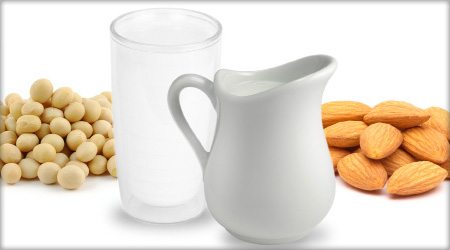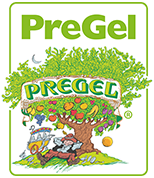
A tall glass of milk with cookies, milk for your morning cereal, milk in your daily coffee … milk as we know it is getting a run for its money, as cow’s milk is moving over to make room for a wide variety of alternative “milks.”
While nondairy milks initially emerged on the market largely due to lactose intolerance, milk allergies and vegan diets, nowadays the motivation is more diverse – ranging from debates over bovine artificial growth hormones to concerns about the carbon footprint of large dairy farms. Whatever the reason, nondairy milks are expanding their market segment, and consumers have an emerging interest in seeing them in new product offerings as well as on menus at their local eateries.
Incorporating alternative milks into your product line will gain you favor among those with special dietary needs, while showing everyone your awareness of new demands and trends within the food industry. Alternative milks can substitute cow milk at a 1:1 ratio in recipes; however, there are many other important components to consider such as flavor, texture, sugar, fat content, potential additives and temperature effects on flavor. Though not dramatically, alternative milks will generally increase food costs depending on purchasing and quantities. Be prepared that alternative milks will generally increase food cost. Let’s take a closer look at the most common milk alternatives seen on the market today.
SOY MILK
Often considered the first and generally the most widely available alternative milk, soy milk is made from ground soybeans, water and sweetener (usually brown rice syrup). Soy milk is high in protein and is one of the thicker and creamier milk alternatives, thereby emulating the richness of cow’s milk. Its flavor is distinctive – notably nutty and somewhat sweet; however, the flavor profile varies significantly from brand to brand. Soy milk tends to curdle when boiled or introduced to acidity, so recipes containing it should be tested for stability. Soy is a common allergen, so consumers must be informed of its presence.
NUT MILK
While technically any nut could be used, the most common in this category is almond milk, which is made from ground almonds, water and sweetener. Its lightly sweet, subtle almond flavor lends itself to a variety of uses, especially in dessert products. The flavor profile of almond milk is sometimes preferred over the stronger flavor of soy; however, like soy, almond introduces a nut allergy concern. The “good” fats and nutrients of nuts make nut milks a good choice from a nutritional point of view.
RICE MILK
Made from boiled rice, water and sweetener, rice milk contains a low protein content but the commercial versions are generally fortified with other nutrients. When compared to other milk alternatives, rice milk has the thinnest (most water-like) consistency, while having the mildest and perhaps most pleasant flavor profile. Some brands may be rather sweet and often contain thickening agents, so ingredient labels should be read carefully. Rice milk is an attractive choice for those with allergy concerns, and also among vegans and vegetarians.
OAT MILK
Oat milk is produced from hulled oat grain (and occasionally a combination of other grains) and water. Noted for its mild flavor, oat milk is considered quite versatile and perhaps the closest in flavor and texture to low-fat and fat-free cow’s milk. It responds well to heat and mixes well with other flavors. The protein and fiber content of oat milk boost its nutritional value; however, depending on the manufacturer, it may not be suitable for the gluten-free diet.
HEMP MILK
Considered the “newest milk on the block,” hemp milk is made from hulled hemp seeds and water. The flavor of hemp milk is rather strong and distinctive, with nutty and earthy overtones, but may lend itself to a variety of flavor pairings. Hemp milk, like rice milk, is a good choice when creating allergen-free products and also boasts a high omega-3 content for nutritional benefit. Hemp milk is expected to continue to grow in popularity in the U.S. market.
The flavor profiles noted here assume the use of the plain version of these milks, but most now offer vanilla and chocolate varieties as well. All of the above examples are both dairy- and lactose-free, but gluten-sensitive individuals should exercise caution and read product labels carefully. Before making any dairy-free claims about your products, be sure there are no cow’s milk traces that may pose a risk for severely allergic individuals. It is worth noting that other trendy milks such as those from goat, sheep, buffalo or camel are still of ruminant origin, and therefore are not suitable for those with allergies to the animal proteins found in these milks. Also, be careful about storage and shelf life – most of these milks are shelf-stable until opened, at which point they require refrigeration and vary in shelf life duration. Last, many nondairy milks are now fortified with vitamin D and calcium to boost their nutritional content closer to that of cow’s milk, but be sure to read the nutritional label carefully. Whether your focus is on the dietary or trendy aspects of alternative milks, your business will likely profit from including a few nondairy offerings … just don’t tell the local cows.
For assistance on recipes utilizing alternative milk products, contact PreGel’s Professional Training Center at 866 977 3435 or by e-mail to
training@pregelamerica.com.
Resources:
Groce, V. (2008). Milk Alternatives and Dairy-Free Beverages. Retrieved from About.com: http://foodallergies.about.com/od/dairy/tp/milkalternatives.htm [July 9, 2011].
Kadey, M. (2011). Alternatives to Milk. Retrieved from Active Network, Inc.: http://www.active.com/women/Articles/Alternatives_to_Milk.htm [July 9, 2011].
Dairy Substitutes. 2011. Retrieved from Go Dairy Free: http://www.godairyfree.org/Table/Dairy-Substitutes/ [July 9, 2011].
Donenfeld, J. (2010). Holy Cow! 5 Healthy Dairy-Milk Alternatives. Retrieved from TheHuffingtonPost.com, Inc.: http://www.huffingtonpost.com/jill-donenfeld/holy-cow-5-healthy-dairy_b_587451.html#s92953&title=Coconut_Milk [July 9, 2011].
